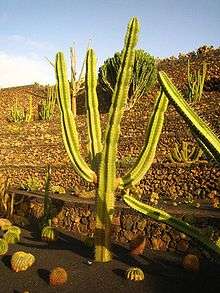Neoraimondia
Neoraimondia is a genus of medium to large cacti from Peru. The genus is named after the Italian-born Peruvian explorer, naturalist, and scientist, Antonio Raimondi. It is a psychoactive cacti and its different cacti have been known to contain the chemicals 3,5-Dimethoxy-4-hydroxyphenethylamine and 3,4-Dimethoxyphenethylamine. It is mixed into a hallucinogenic beverage called "Cimora" along with Trichocereus pachanoi. [1]
| Neoraimondia | |
|---|---|
 | |
| Neoraimondia herzogiana at Lanzarote | |
| Scientific classification | |
| Kingdom: | |
| (unranked): | |
| (unranked): | |
| (unranked): | Core eudicots |
| Order: | |
| Family: | |
| Subfamily: | |
| Tribe: | |
| Genus: | Neoraimondia |
| Species | |
|
see text | |
| Synonyms | |
|
Neocardenasia Backeb. | |
Species
| Image | Scientific name | Distribution |
|---|---|---|
| Neoraimondia arequipensis | Peru | |
| Neoraimondia herzogiana | Bolivia | |
gollark: Why would people get *more* customers if they scammed people out of money?
gollark: That one.
gollark: no.
gollark: If you do reset it why do you expect it to work out better?
gollark: I've decided to throw my own metaphorical hat into the ring of today's suggestions, since it seems to be descending further into insanity *anyway*.
References
This article is issued from Wikipedia. The text is licensed under Creative Commons - Attribution - Sharealike. Additional terms may apply for the media files.